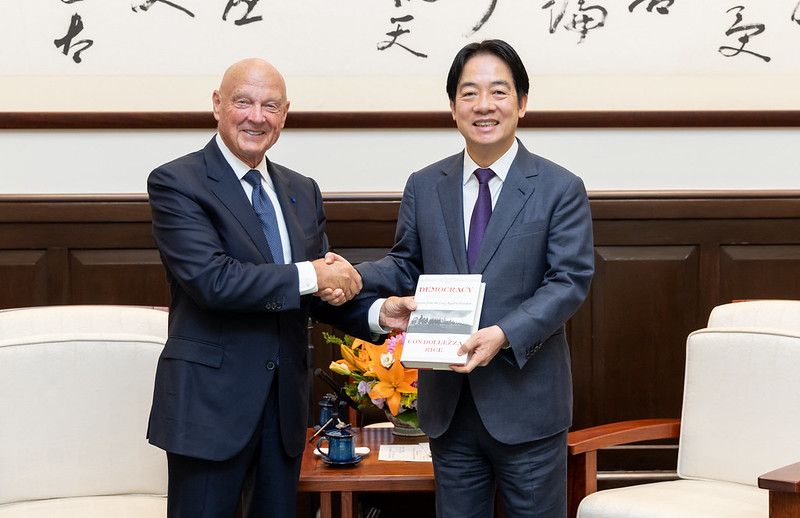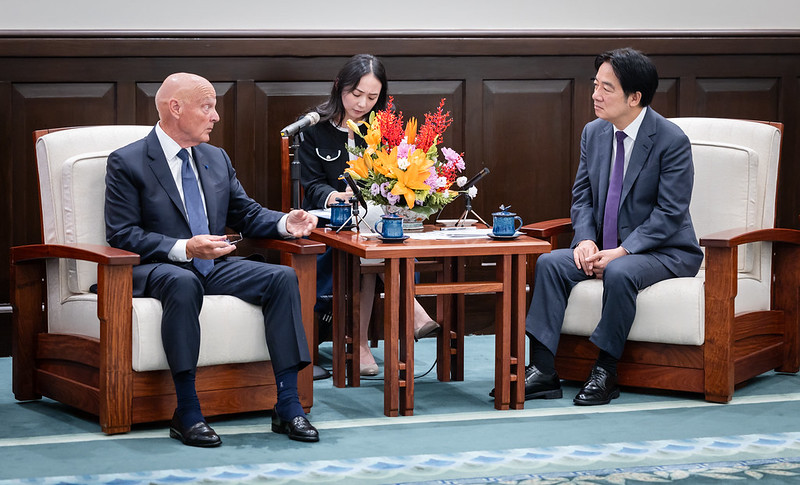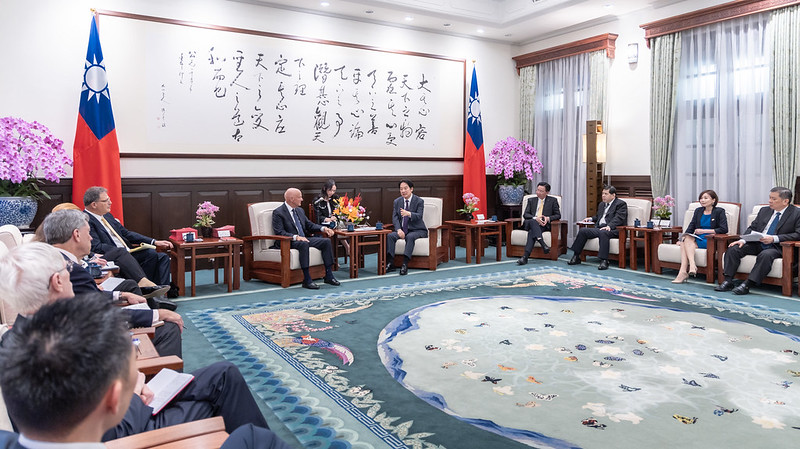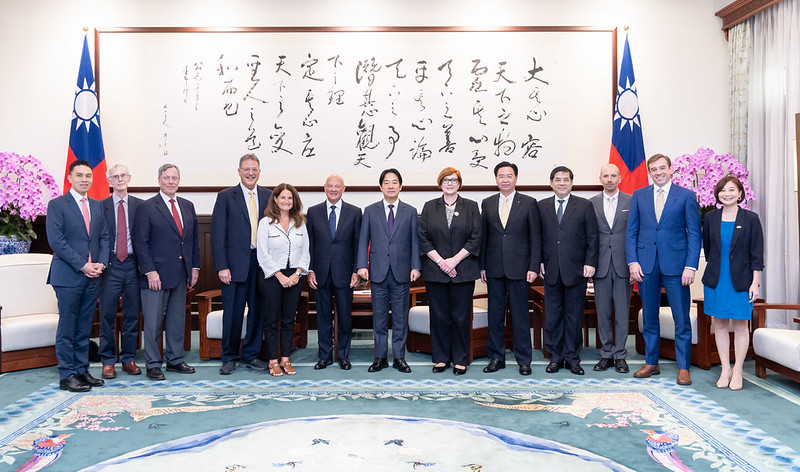News & activities
 News releases
News releases
On the morning of September 10, President Lai Ching-te met with a delegation of experts and scholars from the Hoover Institution at Stanford University and affiliates involved in its Project on Taiwan in the Indo-Pacific Region. In remarks, President Lai thanked the Hoover Institution for its long-term and in-depth research into issues concerning Taiwan, which has been crucial in helping Taiwan gain even more international support. The president indicated that while the partnership between Taiwan and the United States is strong and solid, as we face the global expansion of authoritarianism, we must build even more secure and resilient supply chains. President Lai expressed that he looks forward to deepening bilateral cooperation across all domains as we jointly advance global prosperity and development.
A translation of President Lai’s remarks follows:
I extend a warm welcome to Admiral James O. Ellis Jr. (Ret.) as he leads a Hoover Institution delegation to Taiwan once again. Your visit shows more than just your warm friendship; it also shows strong support for Taiwan. The Hoover Institution is one of the most influential think tanks in the US. The policy recommendations you make, including your insights on the situation in the Taiwan Strait, are deeply valued by both the US government and the international community. I would like to thank the Hoover Institution for its long-term and in-depth research into issues concerning Taiwan. This has been crucial in helping Taiwan gain even more international support. I look forward to exchanging views on Indo-Pacific affairs with the experts and scholars in your delegation.
In recent years, Russia’s invasion of Ukraine, conflict between Israel and Hamas, and Chinese military actions have posed tremendous challenges to global peace and the rules-based international order. Located in the first island chain, Taiwan stands on the frontline of the democratic world. We will continue to do all we can to contribute to democracy, peace, and prosperity around the world.
Taiwan will implement its Four Pillars of Peace action plan so as to maintain peace and stability across the Taiwan Strait. This includes strengthening national defense, building economic security, strengthening partnerships with democratic countries, and stable and principled cross-strait leadership.
Over the past few years, the US has been creating a latticework designed to boost mutual support among alliances and partnerships in the Atlantic and Indo-Pacific. We hope that Taiwan, the US, and democratic partners around the world can continue to bolster strength in unity through even closer cooperative networks, jointly supporting the democratic umbrella to protect democracies from the threats of expanding authoritarianism.
The partnership between Taiwan and the US is strong and solid. But as we face the global expansion of authoritarianism, we must build even more secure and resilient supply chains. We look forward to Taiwan and the US resolving the issue of double taxation as soon as possible and expediting the next round of negotiations for the Taiwan-US Initiative on 21st-Century Trade. This will deepen bilateral cooperation across all domains as we jointly advance global prosperity and development.
I believe that freedom and democracy are not only values shared between Taiwan and the US, but also beliefs held dear by everyone here today. Thank you for visiting and for demonstrating the Hoover Institution’s staunch support for Taiwan. Moving forward, I hope we continue to work together to contribute to democracy, peace, and prosperity around the world.
Admiral Ellis then delivered remarks, saying that the delegation is deeply honored by the courtesy President Lai extended and that they are delighted to return to Taiwan after a substantive and meaningful visit two years ago. Again this time, he said, they bring a diverse group of American specialists focused on Taiwan, the People’s Republic of China, and US foreign policy and national security. The admiral noted that the delegation also includes a senior participant from Australia, former Minister Marise Payne, who is now a distinguished visiting fellow at the Hoover Institution. Her presence here today, he said, reflects the purposeful exchanges now increasingly occurring amongst trusted Indo-Pacific partners who wish to preserve a stable and prosperous region.
Admiral Ellis said that since their last visit, they have watched as Taiwan has undertaken a variety of important challenges with considerable success, noting that the gross domestic product in Taiwan, Asia’s eighth largest economy, is once again on the rise. Demand for Taiwan’s exports is growing, he said, and the island is an indispensable node of a transforming and increasingly resilient global supply chain. Taiwan’s focus on appropriately addressing the island’s defense security needs continues, Admiral Ellis stated, as does the commitment of the US and Indo-Pacific partners to preserving regional stability.
Admiral Ellis stated that the confidence the Taiwanese people have put in their elected representatives to constructively address these priorities and other decisions ahead is clearly felt from across oceans. To that end, and most importantly, he said, the delegation brings sincere congratulations as Taiwan has again enjoyed a free and fair election, demonstrating to the world how an exemplary democracy enables a peaceful transition of political leadership.
Nevertheless, Admiral Ellis emphasized, this remains a dangerous world for us all, and over these past two years, their concerns about the escalating threats to peace and stability for the people of Taiwan and the Indo-Pacific region have only deepened. Admiral Ellis stressed that each member of the Hoover delegation may have different political and professional views, but they feel that Taiwan’s future and their futures are linked together. In the wake of the Russian invasion of Ukraine, and now combined with the increasingly troubling collaboration among China, Russia, Iran, and North Korea, he said, what happens in one part of the world reverberates to others.
Admiral Ellis stated that we are all truly living in a historical moment, and our democracies all face new responsibilities in order to deal with that reality. He then stated that we can be stronger together in peacetime activities, in how we respond to provocations such as those related to cybersecurity, and if necessary, in crisis, remarking that every Taiwanese engineer working long hours with new American colleagues, every Taiwanese student venturing to an American university, and every molecule of liquid natural gas bound for Taiwan from America all make us stronger.
Admiral Ellis said that the delegation has come to Taiwan principally to listen and learn. He then stated that as President Lai noted in his own remarks, the most successful and enduring forms of cooperation among peoples are based on shared values. Our collective commitments to preserving those values will be demonstrated by the actions we take, individually and collectively, he said. In closing, Admiral Ellis stated that they could not ask for a better partner than Taiwan on this historic journey.
Among the members of the delegation was Hoover Institution Senior Fellow Dr. Larry Diamond.












